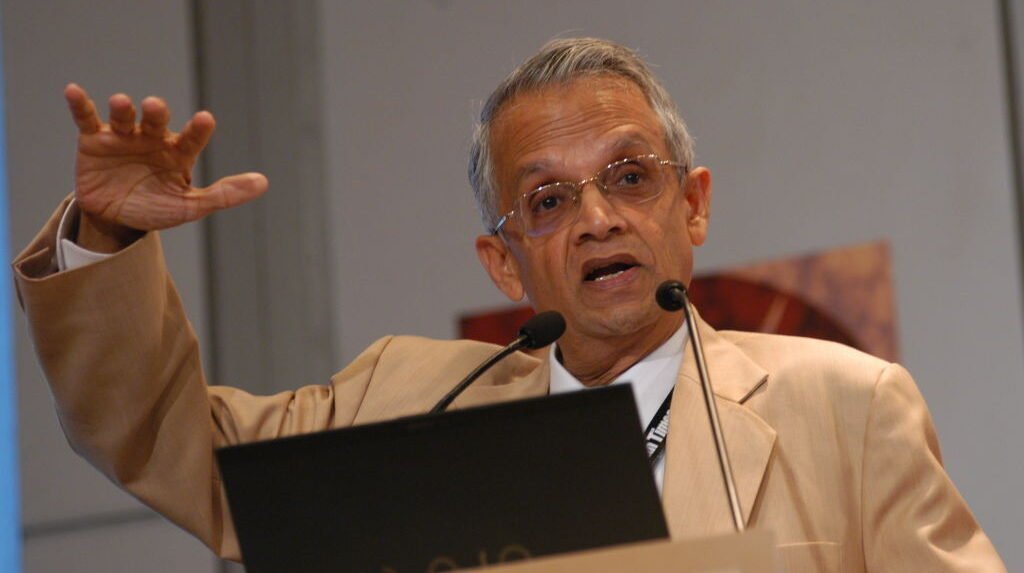
UC San Diego’s Veerabhadran Ramanathan to Receive International Environmental Award ‘Blue Planet Prize’
Veerabhadran Ramanathan, Indian American climate scientist at U.C. San Diego, is set to receive the Blue Planet Prize, an international environmental award. He is seen above speaking at the Hindustan Times Leadership Summit, on Oct. 13, 2007 in New Delhi, India. (Sanjeev Verma/Hindustan Times via Getty Images)
India-West Staff Reporter
The University of California June 17 announced that Veerabhadran Ramanathan, a renowned climate and atmospheric scientist at Scripps Institution of Oceanography at UC San Diego, will receive the Blue Planet Prize, the international environmental award sponsored by Japan’s Asahi Glass Foundation.
Ramanathan, the Edward A. Frieman Endowed Presidential Chair in Climate Sustainability at Scripps, has spent decades investigating the climate effects of global warming pollutants other than carbon dioxide.
The Indian American scientist helped uncover the role of short-lived climate pollutants such as methane, tropospheric ozone, halocarbons, and black carbon, a news release said.
His contributions include the discovery of the super-greenhouse effect of chlorofluorocarbons, and clarification of the climate effects of black carbon through an international field project he led on Atmospheric Brown Clouds, it said.
Ramanathan showed that reductions in SLCPs can rapidly reduce warming and significantly improve air pollution. He later took the initiative to spearhead global actions to reduce SLCPs, the UC release noted.
“This prize is like the North Star for me since it will amplify my climate solution efforts – bridging gaps across political chasms and bringing science into alliance with policy and faith for climate actions,” Ramanathan said in a statement.
“This prestigious recognition of Professor Ramanathan’s groundbreaking work in atmospheric science and advocacy is well deserved,” said U.C. San Diego Chancellor Pradeep K. Khosla. “His collaborative and interdisciplinary research has advanced the frontiers of knowledge, shaped a new field of study, and led to discoveries that have and will continue to transform many lives.”
Ramanathan joined Scripps Institution of Oceanography in 1990, having already garnered a reputation as one of America’s leading climate scientists. Early in his career, he had observed the greenhouse effect of ozone-depleting industrial chemicals and made groundbreaking measurements of the Earth’s heat budget, his bio said.
He also demonstrated that aerosol pollutants such as black carbon soot could contribute significantly to global warming while also endangering public health and diminishing crop yields.
In the 2000s, a series of events led Ramanathan to step beyond field research to tackle climate change in other ways. Pope John Paul II appointed him to the Pontifical Academy of Sciences, an advisory panel.
In recent years, Ramanathan has engaged with the American evangelical community and faith leaders including the Dalai Lama on the need to protect creation and press for environmental justice, it added.
This year’s fellow recipient of the Blue Planet Prize is Sri Lankan Mohan Munasinghe, the founder and chairman of the Munasinghe Institute for Development. Munasinghe pioneered the integrative, transdisciplinary “Sustainomics” framework which views development issues from environmental, social, and economic perspectives. Innovative concepts like “balanced inclusive green growth” and “millennium consumption goals” emerged from Sustainomics.
According to the Asahi Glass Foundation, each recipient is presented with a certificate of merit, a commemorative trophy, and 50 million Japanese yen in prize money. The award ceremony is scheduled to take place on Oct. 6 at Tokyo Kaikan.




